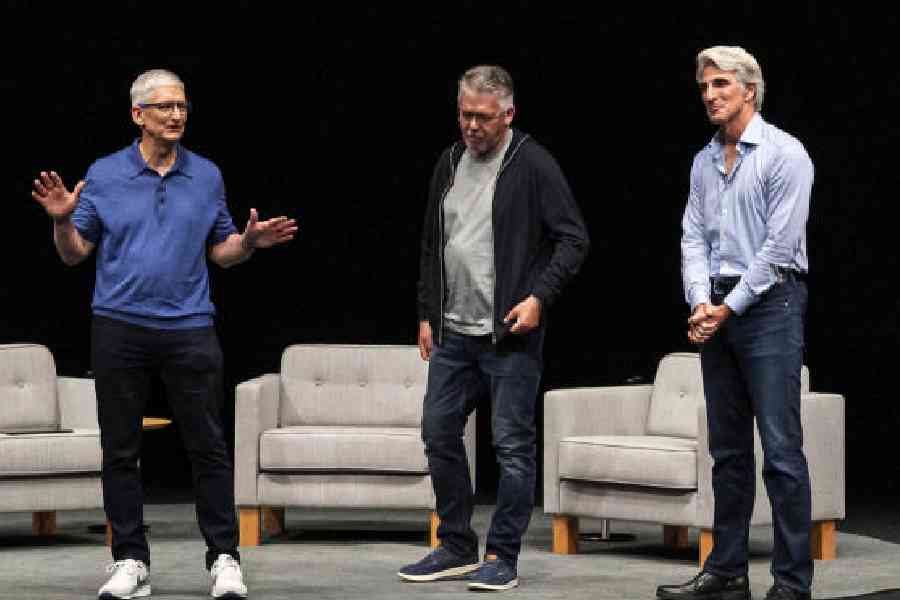Apple is 48 years old, which has put enough maturity on its side to come up with a roadmap for delivering artificial intelligence better than most companies, especially when one considers its deep-rooted commitment towards privacy. With Apple Intelligence, the Tim Cook-led company proves that so far talks about AI being a “new species” have been futile and there is a chance to make use of the technology in ways that can prove helpful to users.
“We want AI not to replace our users, but to empower them,” said senior vice-president of software engineering Craig Federighi when he took the stage with John Giannandrea, Apple’s senior vice-president of machine learning and AI strategy, at the Steve Jobs Theatre soon after WWDC’s keynote moment.
These are the two people who have been closely involved with Apple’s strategy to revamp Siri, bringing machine learning to devices and the Cloud and everything around AI that Apple announced.
What makes Apple Intelligence different?
Apple Intelligence is something that all Apple users can put to use. Thanks to its silicon, the set of AI features is being favoured over what most Cloud-based competition is promising to offer.
Instead of looking AI from the perspective of a big model, think of it as a collection of smaller models that can efficiently run on Apple’s devices and chips themselves. There will, of course, be times when more power would be required. More of that later.
The company hasn’t been stagnant around AI though it didn’t use the terminology vastly in the past. Your iPhone already has around 200 machine-learning models already to tackle everything, from curating memories to detecting a car crash. And now it has become far more powerful.
Giannandrea said that the “right approach” “is to have a series of different models and different sizes for different use cases”. He said the company has worked to create a 3-billion parameter model as part of Apple Intelligence. More the parameters, more the memory and computing power is needed to run a model.
Apple’s strategy is faster than exclusive Cloud-based offerings besides, it has more privacy benefits. Using, say, the iPhone, AI can make sense of one’s appointments. For example, if AI could know that you need to keep an appointment and you are running late, why not help with a mail asking the meeting to be rescheduled. Usually, it’s a series of time-consuming processes but Apple Intelligence can make it happen like clockwork.
Federighi offered an example: His phone knows who his kid is. “We’re not sort of taking this teenager and telling him to go fly an airplane. ‘Here’s what you’re good at. You can flip burgers or something.’”
“We think about what it means for intelligence to be really useful, it has to be centred on you,” Federighi said. “That requires some really deep thoughts about privacy.”
The strategy is allowing Apple to focus on reducing hallucinations in its models partly by using curated data. “We have put considerable energy into training these models very carefully. So we’re pretty confident that we’re applying this technology responsibly,” Giannandrea said.
For Apple, AI is a long-term strategy and the Apple Intelligence way of working will allow the company deliver big improvements and features over the years to ensure the iPhone remains relevant for a very long time. Also, the strategy ensures that Apple Intelligence will be less prone (if at all) to hallucinate.
Consider some of the new features Apple Intelligence can handle: Summarize and rewrite documents, generate small images, and translate conversations in real-time. Or consider a more complicated feature: Enable users to generate new emojis using AI without connecting to the Internet. All these features are coming your way this fall.
Personal context
There is a gaping chasm between what people expect from AI and what many tech companies are telling the world about AI. First, people do not care about a trillion-parameter neural network because that very term is meaningless. The AI users are looking for has to do with making things easy. Who wants to go through 2,723 photographs to stitch together a short video of a family holiday?! Let the device do the heavy lifting. We want Siri to take care of multistep tasks and if AI is needed to generate original visuals, let those be emojis and not deepfakes.
Apple Intelligence is working around personal context. The years 2023 and 2024 proved to be years of AI hyperdrive but the technology needed Apple to move the conversation away from hyped AI models.
No Elon, you’re wrong
Elon Musk tried to drive the conversation his way with claims that the partnership between Apple and OpenAI will lead to“an unacceptable security violation”. There’s nothing like that. Google has Android devices to showcase its AI prowess, Microsoft has Windows while OpenAI now can handhold Apple to get better access to users who don’t mind AI tools. Elon Musk has Grok while X is a platform that continues to be controversial.

Apple has announced new updates across its platforms that help empower users and keep them in control of their data
Users need to understand that there are basically two tiers of AI coming to newer iPhones, Macs and iPads. First is Apple’s Apple Intelligence. Second is OpenAI’s ChatGPT which can take on some tasks if users want. Further, users need to agree each time they want to use ChatGPT.
For example, ChatGPT will be useful if you permit it to write a custom bedtime story for a kid. The keyword here is “permit”. Otherwise, Siri and Apple Intelligence can handle most of the tasks we have.
Around seven per cent of Americans are using ChatGPT daily, according to a recent survey conducted for the Reuters Institute for the Study of Journalism. So, OpenAI now has a chance to improve its standing.
And it’s not really about ChatGPT. Apple said it could offer different models in the future. Federighi pointed out that one day some of its customers may, for example, ask for a medical AI system or legal AI model built into Apple products. The future is wide open.
Private Cloud Compute
One may wonder how will Apple handle tasks that are complicated. This is where Apple’s Private Cloud Compute comes in.
The models that process very complicated requests are servers “powered by Apple Silicon” and the company says it will never store or be able to access your data on its servers. Further, Apple has said that it will let independent experts inspect code running on its servers “to verify privacy”.
“We’re not going to take that data and go send it to some Cloud somewhere…. Because we want everything to be very private, whether it’s running locally or on a Cloud computing service, and that’s the way we want it so we can use your most personal data,” Giannandrea said.
Apple said these servers use Apple chips to prevent user data sent back to an AI server from being stored or re-used.
According to Federighi: “The cornerstone of the personal intelligence system is on-device processing. We have integrated it deep into your iPhone, iPad, and Mac, and throughout your apps, so it’s aware of your personal data without collecting your personal data.” There will be times when a huge amount of compute will be necessary and that’s when Private Cloud Compute comes in.
Your data remains yours
The Washington Post asked Apple CEO Tim Cook about how confident he is that Apple Intelligence will not hallucinate. He said: “I think we have done everything that we know to do, including thinking very deeply about the readiness of the technology in the areas that we’re using it in. So I am confident it will be very high quality. But I’d say in all honesty that’s short of 100 per cent. I would never claim that it’s 100 per cent.”
What’s certain for the moment is that Apple has suddenly jumped ahead with privacy-focussed Apple Intelligence. It can well be the first generative AI platform designed keeping privacy in mind. And now the company has an opportunity to deliver plenty of new AI-powered features year after year through its devices, ensuring the iPhone (besides the iPad and Mac) continues to age gracefully. Add to the mix, powerful Apple silicon driving the game.
(The reporter was in Cupertino, California on an invitation from Apple)










